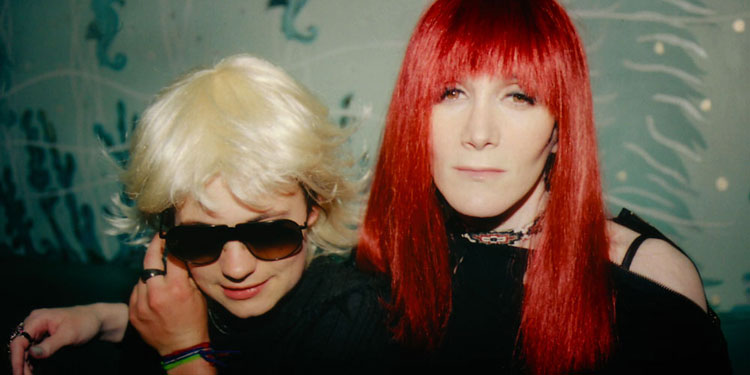
Director: Jeff Feuerzeig
Running Time: 110 mins
Certificate: 15
Release Date: September 19th 2016 (UK)

If you’d never heard of JT Leroy before watching this documentary, I wouldn’t be surprised if you paused it about halfway through to check Wikipedia to see whether all this really happened or whether they’re making it up. It’s an almost unbelievable tale that’s perfect fodder for a good doc, and Author provides it, even if you can’t help wishing there was a little more context.
If you don’t know, in the late 1990s and early 2000s Jeremiah Terminator Leroy was a bit of an enfant terrible of literature, gaining a huge following for his tales of living with a junkie truckstop prostitute mother, becoming a teen hustler and having to survive terrible abuse, all of which was semi-based on his own life. Initially terribly reclusive, Leroy eventually started making public appearances, gaining a cadre of celebrity fans and admirers – from Tom Waits to Courtney Love – and becoming a worldwide cult icon. He was gay, trans (today he might have been described as genderqueer as his gender identity shifted depending on how he felt) and looked almost like a teen Andy Warhol, complete with blond wig.
There was just one issue with it though, Leroy wasn’t a real person. He was the alter ego of 30-something San Franciscan Laura Albert, while in public he was played by Albert’s sister-in-law, Savannah Knoop (Albert took the role of Leroy’s friend/manager, Speedie). Nobody realised – although some had suspicions which aren’t really covered here – until a series of articles uncovered the whole thing in 2006.
Since the revelation, Albert hasn’t spoken a vast amount about what was going on, but this is essentially the story in her own words, using extensive interviews with her, alongside a seemingly never-ending supply of taped phone conversations and pictures documenting the whole thing. In Albert’s eyes, Leroy wasn’t a hoax and you can sort of see her point. He came out of therapy, a persona that initially helped her cope with her own issues without directly confronting them. After that beginning it literally took on a life of its own.
However, she knew what she was doing and she was complicit with it. She is keen to point out that it wasn’t Multiple Personality Disorder, but when watching the documentary, it’s easy to see the whole saga as something akin to it, a condition where the ‘patient’ is knowingly colluding with what they think the therapist wants, but that in this case the unwitting therapist becomes Leroy’s adoring public and celebrity confidants.
Some will undoubtedly feel Albert is painting the whole story in an extremely favourable light and that she’s more culpable than she’d like to admit in what at times was a fairly extreme deceit, which played on other people’s emotions and trust to an occasionally intense degree. As a viewer, it’s tough not to wonder whether Albert was more conniving than she’s letting on. For example, there seems to be a record of nearly everything, from every phone call being taped to the fact that there seemed to be a fairly conscious effort to ensure every key moment in the development of Leroy was captured with photography or film. Was that due to her mental health issues, or was she deliberately trying to create a record of everything for her own purposes?
Maybe I’m being too cynical, but it’s partly because this is so much Albert’s version of events. While certain other people pop up now and then in new interviews (sometime it seems almost just to prove they’re real people), most of the time it’s Albert talking. As a result, it’s difficult not to wonder what everyone else was thinking. How did nobody realise Leroy wasn’t real, when you’d think it would have been so easy to uncover? Was it an Emperor’s New Clothes situation where some people did know something strange was going on but nobody wanted to say it? Or was Leroy’s backstory and his shy but eccentric behaviour, as well as the fact he always wore an obvious disguise, an accidentally brilliant way to allay suspicion?
What did the likes of Asia Argento think afterwards, having taken Leroy to her heart and directed a film based on one of his books (she was apparently devastated and still hasn’t spoken about it)? Is Albert trying to have her cake and eat it, as well as massively rationalising, by insisting that it wasn’t a hoax? Why did Savannah and Laura’s partner Geoff agree to take it so far (perhaps a kind of knowing mass delusion – and perhaps many of the others involved became party to that delusion rather than solely being duped)?
There’s also the criticism Albert faced over the fact that in the early Leroy ‘story’ he was HIV+. While that was ‘dropped’ later on, it was never denied, and became part of his mythos. While Albert is pretty dismissive of those who were angered by the fact she’d used HIV to help build Leroy fictitious persona and it was one of the things that helped people take notice, you can’t just brush it under the carpet by saying they deleted that part of the backstory later on. Indeed, there are moments throughout when it’s clear Albert thought of JT as a real person that she had control over and could change as she liked, but that she perhaps didn’t think of those Leroy interacted with as being as real as she thought her creation was – they were just part of his story.
Although it would be nice to get a few more insights into these questions, it’s testament to what a fascinating tale this is. Hearing Albert’s side is captivating, and while inevitably you’ve got to wonder whether she’s a reliable narrator, there’s certainly a lot of documentary evidence to back up even the most implausible parts of the tale – it’s more her rationalisations it’s difficult to trust.
It’s a tale that touches on many ideas – identity, creativity, mental health, sexuality, gender, the nature of celebrity, the economics of art, the difficulty of ‘truth’, and the fact that if people want to believe something they probably will. Indeed, the entire Leroy episode was an incredible piece of ‘art’ in its own right, although it’s a difficult one simply because of how many people got hurt and because of Albert’s motivations and actions. It certainly makes for a fascinating documentary, helped by the insightful direction of Jeff Feuerzeig. Now he just needs to make a follow-up where he talks to many of the others involved to get their take on what happened.
Overall Verdict: JT Leroy is undoubtedly one of the most fascinating, incredible, perplexing and audacious literary figures of the last 50 years. That alone would be enough to make this a fascinating documentary, but with Laura Albert’s contribution you get something that gives new insight, while posing as many new questions as it answers.
Reviewer: Tim Isaac
Check out “The Cult of JT LeRoy” http://www.jtleroydocumentary.com
That’s the documentary that doesn’t silence her victims and adds more context